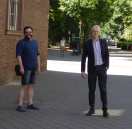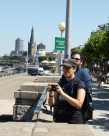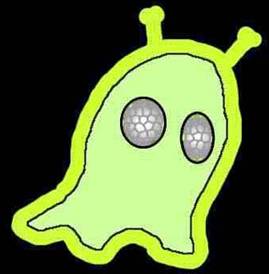U-Con, Eurocon 2017 in Dortmund, June 16-18.
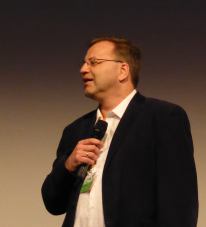
This was a fairly small Eurocon, with 375 attending members. The venue was some kind of school, with a big hall suitable for the main programme and some smaller rooms, a bar and a dealers’ area. Perfect for the size of the convention. Here are some reports from the programme items. For photos I would recommend the collections posted by e g Marcin Klak, Sergii Paltsun and Joerg Ritter on Facebook. I took some photos but they are not as good. Still, here are a couple. For me, the most interesting items were the presentations of German sf, which obviously is not only Perry Rhodan.
Author guests of honour at the opening ceremony:
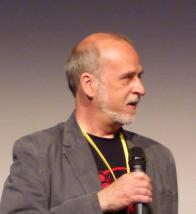
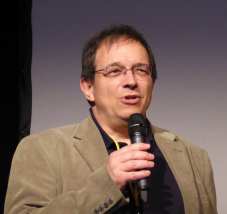
Future Eurocons
Amiens, Nemo, July 19-22, 2018. Pierre Gévart: Theme African sf. The magazine Galaxies has an entire issue dedicated to African sf.
Belfast, Titancon, August 22-24, 2019. Phil Lowes.
Bid: Rijeka, Croatia, Futuricon 2020, October 2-4, 2020.
Another con, that a Lithuanian fan told me about: Lituanicon in Vilnius, September 30, 2017.
Bilingual science fiction, talk by Francesco Verso from Italy
The start of sf is fictionalised ideas, see wardshelley.com for the history of sf. Can be called “the fiction of transformation”. Anthony Dunne and Fiona Raby: Speculative Everything. Design, Fiction, and Social Dreaming, MIT Press. Verso publishes sf by authors from all over the world (http://www.futurefiction.org ) and in an anthology, Nebula, with English and Italian in parallel. Authors mentioned: Ekaterina Sedia (Russia, USA), Tendai Huchu (Zimbabwe), Efe Tokunbo (Nigeria, Mexico), Pepe Roja, Michalis Manolios (Greece, author of “Aethra”), Xoa Jia translated by Ken Liu, Zhang Ran (China, translated by Ken Liu: Ether), Chen Qiufan (China).
German contemporary sf, talk by Martin Stricker
There are approximately 100 million German-speaking readers. Portal: deutsche-science-fiction.de. The longest series is the Perry Rhodan one, but the concept is for me not interesting since world-building is one of the most interesting aspects of sf. List of authors:
Thosrsten Küper, who talked about Second Life at the convention. He writes cyperpunk with underdogs who are revolting. http://kueperpunk2012.blogspot.se/.
Michael K. Iwoleit writes cyberpunk with immortality.
https://iwoleit.wordpress.com/, in English. His story “Das Netz der Geächteten” has won the Deutscher Science Fiction Preis and has just been republished by Tor, http://www.tor-online.de/fiction/2017/05/das-netz-der-geaechteten-michael-k-iwoleit/.
Nadine and Uwe Post write in a unique humorous-satirical style.
http://www.nadine-boos.de/wordpress/ & http://upcenter.de/wordpress/
Heidrun Jänchen. https://heidrunjaenchen.wordpress.com/
Karla Schmidt has weird ideas.
https://karla-schmidt.de/ She has a short story in Clarkesworld #119.
Oliver Henkel writes alternate history. http://oliverhenkel.com/
Frank W. Haubold is a stylish sf author. http://frank-haubold.de/
Wolfgang Jeschke is the most important editor with over 100 anthologies.
Herbert W. Franke is a 90 year old Austrian. His books have been translated by DAW books.
Helmuth W. Mommers writes about life in the future. http://helmuthmommers.de/.
Andreas Eschbach is the most successful German sf author and his Lord of All Things is most well-known. http://andreaseschbach.com/
Andreas Brandhorst won the Kurt Laßwitz Preis 2017 for Omni.
https://andreasbrandhorst.de/
Dietmar Dath has a difficult language and is a radical left-wing author.
Frank Hebben writes stylish cyberpunk. http://www.schwarzfall.de/
Axel Kruse
Nina Horvath is of course a well-known Austrian fan but also a winner of the Deutschen Phantastik Preis 2012 for her story “Die Duftorgel”.
http://ninahorvath.at/
Gabi and Arno Behrend, organizers of U-Con, are also authors.
Matthias Falke writes space opera.
Dirk van den Boom writes entertainment sf. https://sfboom.wordpress.com/
Michael R. Baier writes space opera. http://www.coruum.com/
SF libraries: Wetzlar http://www.phantastik.eu/ and Villa Fantastica Wien http://www.villafantastica.com/
Science fiction in the German Democratic Republic, talk by Karlheinz Steinmüller
Prehistory: The classic Auf zwei Planeten by Kurd Laßwitz. Hans Dominik: Die Macht der Drei (1921) and Treibstoff SR (1939). The films Metropolis (1927) and Frau im Mond (1929), both directed by Fritz Lang.
1950’s: Utopian stories: Heinz Vieweg: Ultrasymet bleibt geheim (1955), Eberhardt del’Antonio: Gigantum (1957), H. L. Fahlberg (pseudonym for Hans Werner Fricke): Betatom (1957), Werner Bender: Messeabenteuer 1999 (1956, for children).
Thrills in utopia could be competition between industries or accidents, and it could also be due to imperialist spies and sabotage.
Comic strip Mosaik by Hannes Hegen, Arthur Bagemühl: Der Weltraumschiff (1952, for children). In the story “Gefangene des ewigen Kreises” (1956) by Günther Krupkat the cosmonauts suffer from space madness (Raumkolle) from being in the small space of the spacecraft. In del’Antonio’s Titanus (1959) there was a nucelear catastrophe.
The film Der schweigende Stern (1960) directed by Kurt Maetzig is based on the story “The Astronauts” by Stanisław Lem.
Steinmüller compared the “prime directive” in Star Trek with ambivalence towards export of revolution in East German SF. Lothar Weise: Das Geheimnis des Transpluto (1962), Hebert Horstmann: Die Stimme der Unendlichkeit (1962), Eberhardt del’Antonio: Heimkehr des Vorfahren (1966).
Heiner Rank: Die Ohnmacht der Allmächtigen (1973).
Critical voices: Günther and Johanna Braun: Der Irrtum des Großen Zauberers (1972), Der Fehlfaktor (1975), Unheimliche Erscheinungsformen auf Omega XI (1974, about a superaffluent society). Erik Simon: Die ersten Zeitreisen (1977, with Reinhard Heinrich), Fremde Sterne (1979), Mondphantome, Erdbesucher (1987). Gert Prokop: Wer stiehlt schon Unterschenkel? (1977).
In the 1980’s there were stories about the many worlds, and there was a statement about what sf is not: Not about the future, not about real science, and not a pedagogic means.
Ekkehard Redlin: “Entpflichtung im Nirgendwo” in the anthology Lichtjahr 3 (1984), deals with how to get rid of obligations. Gottfried Meinhold: Weltbesteigung (1984), Angela and Karlheinz Steinmüller: Andymon (1982).
Censorship: Words to avoid were “bureaucracy” and “generation conflict”. And the the wall came down. Karsten Kruschel: Das kleinere Weltall (1989, short stories), Andreas Melzer: Vorstoß nach Andromeda (1990), Angela and Karlheinz Steinmüller: Der Traummeister (1990).
GDR as counterfactual history: Christian von Ditfurth: Die Mauer steht am Rhein. Deutschland nach dem Sieg des Sozialismus (1999).
The panel Fake Olds talked about the new story collection Leichter als Vakuum by Angela and Karlheinz Steinmüller.
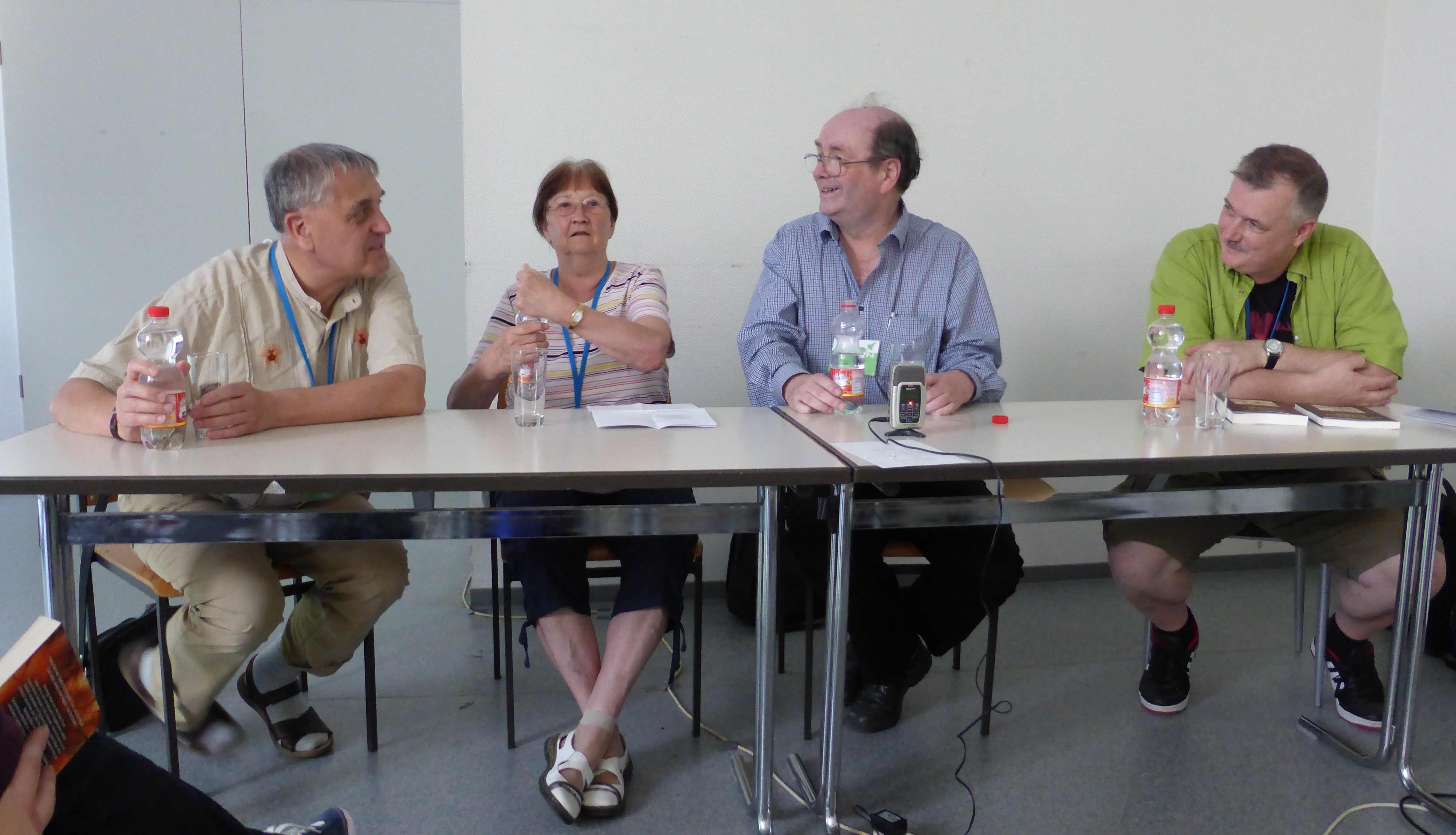
I also listened to the entertaining talk by Nina Horvath about her experiences as a TAFF-delegate, an informative talk about possibilities for life on other planets, a panel about fanzines, a talk about science as depicted in fiction and some other programme items.
After the con we went to Düsseldorf to catch the plane to Stockholm, but we had to wait for a couple of hours which we spent walking to the river Rhein and in the Altstadt.
